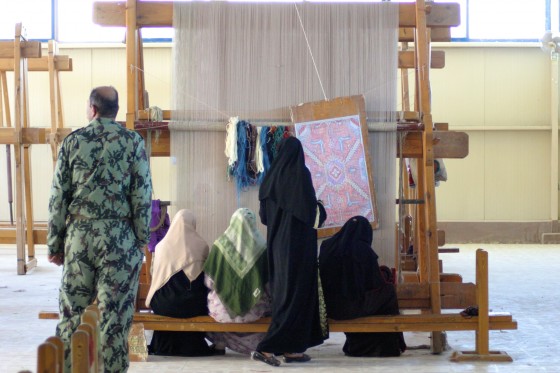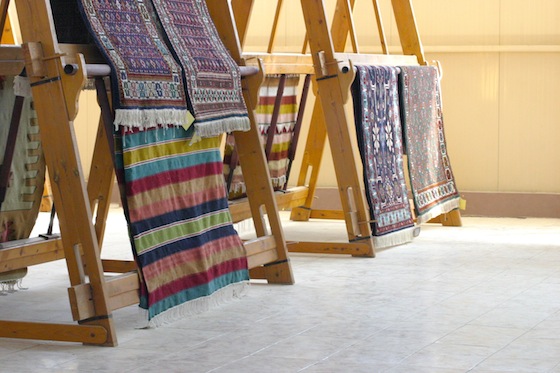 These women in the Siwa oasis near Libya are trained in the traditional craft of weaving Kleem (rugs). Tafline takes a rare inside look at their work.
These women in the Siwa oasis near Libya are trained in the traditional craft of weaving Kleem (rugs). Tafline takes a rare inside look at their work.
You might have already read about the first part of our journey where our bus kept breaking down on the road to Siwa. When our host Yehia secured permission from the Egyptian army manager for us to take photos at the carpet factory in Siwa, my traveling companions and I lost no time. Veiled women are usually exceptionally camera shy so this opportunity was at once unusual and exhilarating.
Of course, the women were less thrilled than we, so when they turned away from our peering lenses, I put my camera away.
But before that, I was able to capture a scene that will give our readers a unique glimpse into a world that few people get to see. “The Productive Unit for Environmental Industries” in the Siwa oasis near Libya is working to revive a dying heritage. (See our story on Bokja in Beirut to understand why traditions are important).
Here local Berber and Bedouin women are trained in the traditional craft of weaving Kleem (rugs). In return, they receive both a small salary and commission.
 It isn’t easy to communicate with the people at the carpet factory in Siwa. Had I known that behind this ambiguous sign – “The Productive Unit for Environmental Industries” – sat a group of women who earn an income for their families by weaving rugs in the traditional way, I would have visited with a translator. But I had no way of knowing that and our trip here was not planned.
It isn’t easy to communicate with the people at the carpet factory in Siwa. Had I known that behind this ambiguous sign – “The Productive Unit for Environmental Industries” – sat a group of women who earn an income for their families by weaving rugs in the traditional way, I would have visited with a translator. But I had no way of knowing that and our trip here was not planned.
 Even so, I was able to extract a few crucial details, and pictures tell a compelling story too. Mr. Khaled Amam, the army manager who oversees the day to day running of the factory, shares an easy camaraderie with the weavers who were very curious about our clicking entourage. Many of the women stopped working, others carried on.
Even so, I was able to extract a few crucial details, and pictures tell a compelling story too. Mr. Khaled Amam, the army manager who oversees the day to day running of the factory, shares an easy camaraderie with the weavers who were very curious about our clicking entourage. Many of the women stopped working, others carried on.
Kleem making has a long history in this region, and rugs developed here used to be shipped to different parts of the world, but globalization and capitalism has diminished the viability of this industry and the skills traditionally passed from women to women were at risk of extinction.
Dr. Eng. Shereif A. Temraz, Prof. Assistant, Faculty of Specific Education, Alexandria University-Egypt says that “The significance of the popular heritage (folklore) in studying of the design is…linked to our roots and ammunition against the cultural invasion aiming to deprive us from our Egyptian entity and the future of the traditional crafts.”
For the last 15 years, dozens of women have been trained to use longstanding symbols such as circles, representing the completion of life, and triangles that show the link between earth and sky, in unique designs woven with weft and warp technique.
Roughly 25 weavers and their families currently benefit from this cottage industry, though it is unclear who initiated it, who funded that initiation, and whether the project continues to receive outside help. What is clear is that these rugs, along with bags and other accessories, are sold in the factory, in downtown Siwa, and in Cairo, Alexandria, and other commercial centers scattered throughout the country. Mr. Aman said that the women receive a small stipend in addition to commissions on rugs sold, so it may be that the project is self-sustaining by now.
The Wikipedia definition of sustainable development is as follows: “a pattern of resource use that aims to meet human needs while preserving the environment so that these needs can be met not only in the present, but also for generations to come (sometimes taught as ELF-Environment, Local people, Future).”
While it won’t make them rich, this effort to empower the weavers of Siwa is an inspiring example of sustainable development. Last year we wrote about an Egyptian photographer’s efforts to draw attention to the way in which unsustainable development and tourism threatens the unique culture of this beautiful oasis town. Let this post be a testament to their resilience.
More on Sustainable Tourism in Egypt:
Romantic Desert Lodge in Egypt Offers Fresh Eggs and Sanity
Egypt’s Bahariya Oasis Trampled by Tourism
The Famous Potters of Egypt Got Soul
Green Prophet’s Whirlwind Tour of the Siwa Oasis in Egypt





AWesome!